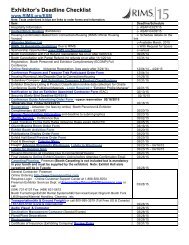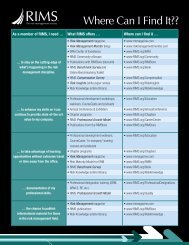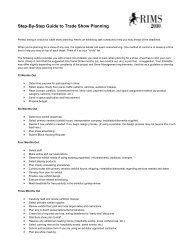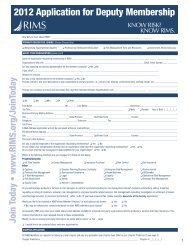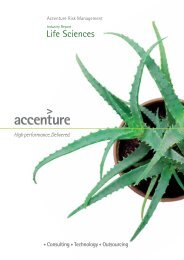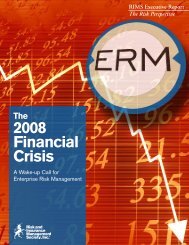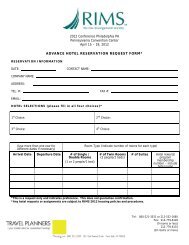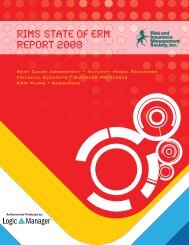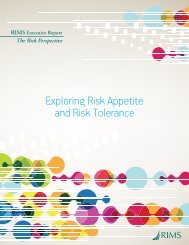Risk Manager Core Competencies - RIMS
Risk Manager Core Competencies - RIMS
Risk Manager Core Competencies - RIMS
You also want an ePaper? Increase the reach of your titles
YUMPU automatically turns print PDFs into web optimized ePapers that Google loves.
CONCEPTUAL SKILLSThis is the strategic layer which requires the ability to understand allthe organization’s activities, how the pieces fit together, and how theorganization can achieve its strategic goals. These skills include theability to adopt a horizontal, portfolio approach of ERM.These skills include:Planning: Determine appropriate goals for an enterprise;goal ori ented; sees the big picture; maintains a global perspective.Organizing: Create an ERM department; staffing; buildrelationships with other stakeholders; create a risk managementculture; leverage diversity.Decision Making: Recognize and analyze problems and makedifficult choices under uncertain conditions in dynamic globalenvironments; use benchmarking to compare apprpriate data; showgood judgment.Management Process: Know the basic five step managementprocess of creating a program, analyzing opportunities, identifyingsolutions, the decision process, and system administration.Ethical Judgment: Know ethical theories; demonstrates a highlevel of ethical behavior - as evidenced by compliance with thefiduciary duties of care (competency and due diligence),disclosure (transparency), and loyalty.Organizational Architect: Able to build business relationships,strategic alliances, and partnerships as well as being able to securemutual benefit from such arrangements..Strategic Thinking: Employ a sense of vision to create newinnovative concepts, products, and solutions.TECHNICAL SKILLSThis is the operational layer where many of the traditional duties andspecialized skills of risk managers come into play.<strong>Risk</strong> Management Process: Understand risk managementmodel; adapt a model to the organization’s needs; understandhow risk creates value. Know the risk management process ofcreating a risk program, analyzing risks, identifying solutions, usinga decision process, and system administration.<strong>Risk</strong> Analysis: Link risk initiatives into critical business drivers; perform risk identification, measurement, and analysis applyingstatistical concepts; create valid risk forecasts; perform riskmapping and risk profiling; determine the cost of risk.<strong>Risk</strong> Control: The ability to apply risk control theories to createprevention, reduction, enablement, and enhancement tactics; cancreate emergency response and business continuity plans.<strong>Risk</strong> Financing: Thoroughly understand risk retention plans andrisk financing transfers, including insurance, alternative riskfinancing, and hybrid plans; prepare allocation to cost centers.Enterprise <strong>Risk</strong> Management (ERM): Understand thetechniques and processes for optimizing risk taking decisions within an organization.Project Management: Understand how to successfully designand implement projects; can prepare risk management reports.Insurance Knowledge: Understand the basics of 1) contractprovisions and legal doctrines; 2) claims management; createportfolios of and place insurance coverage; be knowledgeable ofglobal insurance markets; pricing; risk aversion; regulation; and ableto negotiate, write and renew insurance contracts.Vendor Relations: Establish and maintain agent/brokerrelationships; develop other vendor relationships(third party administrator (TPA), RMIS, legal, safety, etc.).<strong>Risk</strong> Management Information Systems (RMIS):Implement and operate comprehensive RMIS andclaims management systems.CORE COMPETENCY SKILLSThese form the basis upon which all competent managers stand.These skills are sometimes considered the “soft” interpersonal,or personal skills, but they are also in fact the basic businessmanagement skills.Interpersonal:Leadership: Ability to influence others’ behavior toward theenterprise’s goals; having a high emotional intelligence;can build trust while maintaining confidentiality.Motivator: Ability to inspire others to pursue the enterprisesobjectives.Negotiations: Ability to listen and to manage conflicts and achievecompromise while meeting meaningful goals and respecting otherparties’ perspectives.Consensus Builder: Ability to merge many ideas into acohesive plan.Team Builder: Ability to unify workers to achieve a common goal.Personal:Motivated: Inspired to succeed and the ability to help othersachieve their goals as well as being driven to deliver on goals.Innovative: Ability to be creative and inquisitive; seek newsolutions to challenges; and able to be adaptable, flexible, andopen to change.Experienced: Possesses adequate practical experience inappropriate disciplines.Communication: Ability to listen and understand others’ points ofview and to articulate tactfully and respectfully one’s ownperspective orally, in writing, and in presentations.Consultative: Ability to advise the organization’s variousdivisions on how they can manage their particular risks.Business Skills:Accounting: Understand the basic accounting concepts of transaction recognition, matching, and conservatism, and the ability toprepare financial reports.Economics: Understand micro and macro-economics, demandand supply, equilibriums, income, employment, and fiscal policies,money and banking, and resource allocation.Finance: Know capital structuring, capital budgeting, workingcapital management, analyzing financial statements, ratioanalysis, the time value of money, portfolio theory, capital markettransfers, asset/liability matching and financial engineering.Legal: Understand the legal components of the riskmanagement industry.Compliance: Know the fiduciary duties to identify, disclose,and manage an organization’s risks.Human Resource: Understand labor demand and supply,employment process, diversity management, training anddevelopment, and compensation and benefits.Management: Plan, organize, lead, control, and allocateresources.Information Technology: Understand the essential componentsand requirements so as to assist in designing an RMIS;networking.Marketing: Know market SWOT (Strengths, Weaknesses,Opportunities, and Threats) analysis, product development,pricing, packaging, promotions, and distribution; keep up withkey industry trends and developments; know key customersand competitors; know how to differentiate their organizationfrom competitors.Operations: Knowledge of how a business functions, processdesign, capacity planning and scheduling, inventory management,and quality control.Statistics: Understand data collection, description, modeling,probability, hypothesis testing, regression, time series analysis,decision analysis, trend analysis, and forecasting.Security: Securing the physical assets and premises of the enterprise. Ensuring personal security of staff as well as ensuring ofintellectual property and data management systems.Safety: Protecting the physical well-being of personnel againstwork-related accidents, injuries, or other debilitations.Audit: Review the accuracy of an organization’s internal controlsystems and financial operations.<strong>RIMS</strong> Professional Development Department, pd@<strong>RIMS</strong>.orgCopyright 2007 by the <strong>Risk</strong> and Insurance Management Society, Inc. All rights reserved.



